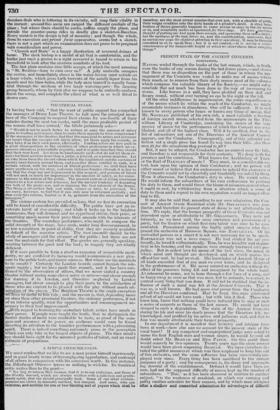THEATRICAL STARS.
IT having been said, " that the want of public support has compelled the manager of Drury Lane Theatre to call upon the principal mem- bers of the Company to suspend their claims for one-fourth of their salaries during the next ten weeks, until the more profitable period of the season shall have arrived," the Globe judiciously asks-
" Would it not be much better to reduce at once the amount of salary given to leading performers, than to make these appeals to their compassion ? If the managers of the theatres find that the sums paid to actors and actresses are larger than the receipts will fairly allow, let them apply the remedy, as they have it in their own power, effectually. Leading actors are now paid in a great disproportion to the members of other professions in which an ex- pensive education is essentially requisite, and it is quite time that they should find their true level. Let them he handsomely paid—but do not let them re- ceive for their services more than a judge, a general, or a prime minister. Let us take from them the absurd odium which the Legislature and the customs of society have thrown around them, and consider them entitled to rank, to a certain extent, with the members of liberal professions : we shall then have. mbre.gentlemen on the stage, and more virtuous females (though it is fair to say that the stage has not degenerated in this respect), and persons of talent will not seek so much for importance in the amount of salary, as for conse- quence in the esteem of the public. The present custom of giving enormous salaries to a few actors and actresses, has the natural tendency of degrading the hulk of the profession, and so injuring the best interests of the drama. The thing is altogether bad, and must, sooner or later, be reformed. We are sorry, however, to find that it can only now be reformed partially ; and that even this reform, limited as it is, Aroceeds from the necessities of the managers."
The vicious custom has prevailed so long, that we fear its correction will be found of considerable difficulty. The public have got an in- veterate habit of star-gazing ; and while it looks up to the brighter luminaries, they will demand, and we apprehend obtain, their price, or something much nearer their price than accords with the interests of the theatres. The secondary performers, who ought to compose the solid strength of the stage, have sunk, under long discouragement, to so low a condition in point of ability, that they are scarcely available in default of the superior artists. The tout ensemble should be the study of managers and the pleasure of the public ; but there are not now the materials for that effect. The grades are, generally speaking, wanting between the good and the bad ; in tragedy they are wholly deficient.
If it were possible to form a starless company of respectable medi- ocrity, we are confident its harmony would communicate a new plea- sure to the public taste, and insure success. But where are the materials to be sought ? Certainly the London boards cannot furnish the ade- quate supply ; but we have made this remark, and it has been con- firmed by the observation of others, that we never visited a country tlieatre without seeing some clever actor or actress—not clever enough for starring it in London, and therefore neglected by London managers, but clever enough to play their parts to the satisfaction of those who arc content to be pleased with the play without much ad- miration of the player...,The Brighton Theatre is the single exception We-art76-firiiitiiM to this rule ; and the reason is, that, depending more on stars than other provincial theatres, the ordinary performers, if not of an inferior quality, want the opportunities and encouragement ne- cessary to their best improvement.
With reeurd to fostering the secendary talent, critics have much in their power. If people were taught the truth, that to distinguish the fainter shades of merit were creditable to taste, as proof of the com- pass and accuracy of its power, an audience would soon be found directing its attention to the humbler performances with a patronizing spirit. There is indeed something extremely gross in the perception which can only take in the largest objects of praise. The finer mind's eye should have sight for the minutest particles of talent, and an exact estimate of proportions.


















 Previous page
Previous page